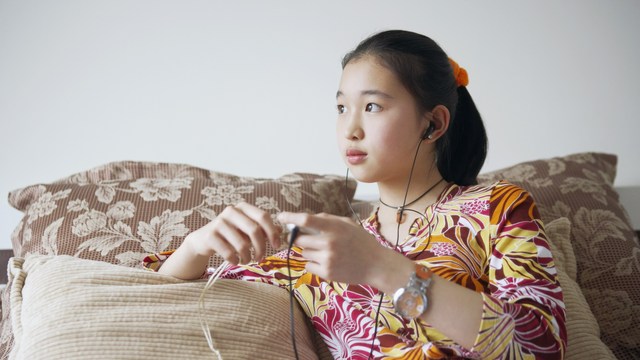Dr. O’Leary shares what a woman should know about hearing loss prevention.
Dr. O'Leary:
Boy, there’s so much in that. First thing I would say about hearing loss prevention is respect how powerful a sense this is. I mean, everybody knows that hearing is very important, but do people know that of all the sense it’s the most important?
I had a Dr. House who trained me when I did my sub-speciality training in ear, asked me once, “Would you rather be deaf or blind?” And I answered him, “I’d probably, it’s a terrible choice.” It reminds me of my kids asking me, “Would you rather die by ants or by crocodiles?” You know, they are both terrible choices, but in this one I said, “I’d rather probably lose my hearing,” and he said, “You’d have made a big mistake.”
And his answer was this, that the hearing is our sense that let’s us evaluate the world and know that everything is safe. It then allows senses like vision, which are going on right now as we talk, focused action, to occur. When you see a deaf child who doesn’t have that sense, they try to use the senses they do have like vision to check their world, and they are absolutely hyperactive.
You look around them and wonder how can that parent even live with this, and all this is, is a bright kid using the wrong sense for a sense of security. So hearing is such a primal instinct for us. To value how important it is, is huge. And how much it’s connected to our sense of frustration and difficulties when we don’t communicate well.
So the first tip for women is if you have a husband who has been exposed to loud noise and it’s more in industrial areas, that’s why more women, more men are than women; however, that’s evening out which is not necessarily a good thing. As more women get in the workplace and are exposed similarly to loud noise, or worse yet, as our kids grow up through concerts and stuff that are attended 50:50, we are seeing similar losses in those populations.
But the bottom line is, as loud noise exposure to ears ends up clipping the high frequencies, which is the information and sound. The constant are all high-pitch sounds, versus the vowels, “I E A O U,” all lower-pitched sounds. When we lose those high-pitched then, they contain the information in sound. The difference between “boat-coat-rote-tote-vote,” all of those are consonants.
So the person who has that high frequency loss in the early phases in a busy room, busy area, will sort of look around and go, “But I am not sure what’s being said.” That’s the piece I was saying is so important about the hearing. When you go one or two cycles with somebody who doesn’t understand you, there’s a real frustration that sets in and it’s part of our wiring as human beings.
As human beings, we are designed to communicate. It’s one of the ways we are wired. So when you miscommunicate, even on one or two sentences, the next thing is a frustration. If we had a brain scan going on when this happened, you’d see that part of the brain that goes off when someone cuts you off on a freeway and makes you growl your teeth, you’d see it light up in big flares because it’s so important to us to be able to be understood and to understand.
More importantly, when people are in an area where they can’t do that anymore, they tend to retract. So a lot of the aging effects that we see as someone gets older, it’s really a sense of them withdrawing from the activity that is the grist of life–the interaction, the back and forth, and even though their brain is still very capable of doing it, they are just not hearing, and so they pull away, and that’s a shame to see in someone who really can be very much involved with their grand-kids and others.
So, the first thing with hearing is if you think there is a problem, get it checked. Get a hearing test; make sure that you are not looking at a hearing loss that really is something that could be helped, and there’s two types of hearing loss we have, by the way. One is actually in the inner ear; this is both the inner ear loss. These little hair cells in the cochleae that are lost, but as we age, also the nerves can decrease a little bit in their performance.
Hearing aids don’t do much for that nerve piece; they do a lot for the hearing piece with the hair cells. So, with a hearing test you can tell it’s an absolute shame when someone is pulled away because of hair cell problems, which a hearing aid takes care of beautifully, and modern hearing aids are nothing like your grandparents’ hearing aids. It’s all computerized now and the newest hearing aids, people actually call me and say, “I just have to tell you how wonderful this is.” I never got that call for 20 years in the early parts of my practice. But now they are comfortable; they don’t whistle; there’s so much that the computer has introduced. It’s a real revolution.
Second thing with hearing, probably the biggest thing for moms particularly is, avoid your kids having that hearing loss from the loud noise exposure. Not only concerts but even things as innocent as the iPod. If you hear some, your child with an iPod that you can hear the sound outside of their ears pretty clearly, that’s coming in at a very high level that the ear is not prepared to hear.
We think about in industrial noise, the whole system for millions of years of evolution was designed with the loudest thing to be heard being a thunderclap, and that was a single loud noise, nothing else louder. So why even have something there? Industrial metal-on-metal noises, loud rock & roll that you really want to feel it, can really damage those delicate hair cells.
So, prevention, prevention, prevention. Don’t get to the point. By the time you notice you’ve got the problem, you’ve done some damage that is irreplaceable at this point. So, a great Christmas present for parents who are interested, give your kids a set of ear molds, custom ear molds. Dr. F in our office makes them, but you can find them wherever you are, a place that will do this for you, and that becomes what they use in concerts.
It’s funny, it’s a little like seat belts; you know, in my generation we sort of abraded that the idea being strapped into a car. My kids wouldn’t even think about sitting in a car if they didn’t have their seatbelt on. It’s an intensely uncomfortable feeling. So these things are the same thing; put them in the concert, you still hear the show beautifully, but you are not going to do the damage. So, that’s really the biggest thing is prevention in hearing loss.
If you are having problems with communication, particularly if you got one side worse than the other, that is a warning sign. That usually isn’t sound related because both ears get the same treatment in sound, and there it is worth seeing a professional who does ears to find out is there something else going on because there’s a whole host of things, I wouldn’t scare people, but they are unusual, but they are very important to pick out early, and because it’s such an innocent piece, “Oh, I just don’t hear so well in this one ear.” That is not an innocent symptom.
We see it quite commonly where people mistake the amount of symptoms with the amount of disease. They don’t correlate necessarily and a good example of this is, you can feel terrible with a bad flu like you want to be dead, and two weeks later you are fine and doing beautifully. Terrible symptoms, tiny disease and the greater scheme of it, a little blood in your sputum or in your stool, or a little hearing loss on one side that doesn’t stop you in your day at all, can actually be your terminal event.
So, pay attention to the signal; that’s the most important thing. That’s not neurosis; that’s being smart. Get it checked. Make sure it’s fine and then get back on with your life; you won’t worry about it again.
About Dr. O'Leary, M.D.:
As a neurotologist, Dr. Michael O'Leary specializes in diseases of the ear and balance, treating all aspects of ear problems, both medical and surgical. Among his unique areas of expertise in the ears are correction of surfer’s ears (exostosis), stapes surgery and repair of chronic mastoidectomy defects. His role on the skull-base team focuses on tumors of the lateral skull base, such as acoustic neuromas and meningiomas. He is also a nationally recognized leader in the development of minimally invasive techniques, including the endoscopic removal of pituitary tumors.











